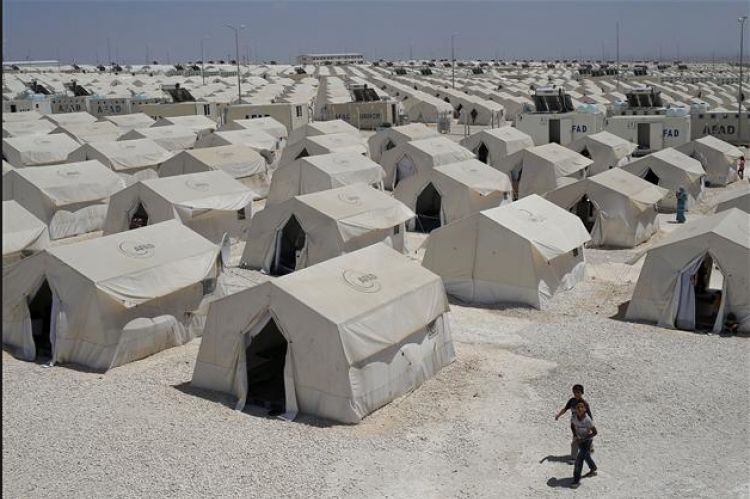Claim: Turkey’s refugee camps in terrible shape
Cihan Tugal writes in the Guardian newspaper that refugee camps in Turkey are in terrible shape
On 15 February 2015, in the Guardian newspaper, Cihan Tugal published an article in which he claimed that Turkey opened its borders to Syrian refugees but didn’t do more to welcome them.1 He alleged that the refugee camps in Turkey are in terrible shape and Syrians have to beg in the inner cities. He also alleged the spread of Syrians has polarised Turkish society. He wrote:
The Turkish regime may have scored many PR points by opening its doors to millions of Syrians, but it can’t do much more than simply allow them in. The refugee camps have been in terrible shape and people have had to beg, or work low-wage, low-security jobs in the inner cities.(...)The increasing presence of Syrians has already had a corrosive impact on Turkish society…The unwelcome spread of the refugees has further polarised an already polarised society.
Turkey opened its borders for Syrian refugees and has maintained an open door policy since 2011. Turkey currently hosts 2.7 million Syrian refugees.2 272,000 refugees are hosted in 26 temporary protection centers (camps) in 10 different cities.3 Other refugees are residing in cities of all over Turkey.
Turkey did not stop at allowing the Syrian refugees in and gave them temporary protection. Through the Temporary Protection Regulation of TBMM (Grand National Assembly of Turkey) that came into operation on 13 October 2014, Turkey guaranteed refugees rights to education, healthcare, security and other social rights. Refugees receive all these services without any charges. Syrian students can attend primary, secondary and high schools in Turkey. Refugees can apply for universities and they are exempted from tuition. Syrian adults can attend vocational courses for free. Turkey has spent nearly $9 billion on Syrian refugees, an amount 20 times more than international aid agencies including the UN have spent.4 By the decision of the Council of Ministers on 11 January 2016, work permits were granted for Syrian refugees.5 Syrians will be paid the same wages as their Turkish counterparts.6 On 18 June 2015, the UN's refugee chief said “Western states should follow Turkey's example in hosting Syrian refugees.”7
In the camps, refugees are provided with food, health services, security services, religious services, educational services and social facilities. All camps have hospitals, areas for courses and areas for sports activities, kindergartens and schools.8 Facilities such as a sewage system, water-supply system, prefabricated toilets and showers, dishwashing units and laundries, TV and internet halls, grocery stores, and places of worship were established at the camps. With monetary aid distributed at the camps each month, all Syrians are able to shop for any food and cleaning items they need at grocery stores. For adults, weaving, hairdressing, tailoring, computing, handcrafts, Turkish, Arabic, and English literacy courses are provided in the camps.
On 13 September 2012, the UN High Commissioner for Refugees Antonio Guterres and the UN Special Envoy Angelina Jolie visited the camp in Oncupinar. Jolie said about the camps that “The generosity of the Turkish government and ability for them to fund such extraordinary camps, it is extremely impressive. As Mr (António) Guterres, High Commissioner, said, we wish that there is enough funds and ability around the world to care for all families who are fleeing conflict and prosecution in this manner. It's quite extraordinary and I've never seen anything quite like.”9 The UN Secretary-General Ban Ki-Moon visited a refugee camp on 7 December 2012 and thanked Turkey for its generous help.10 On 21 June 2015, UN High Commissioner for Refugees António Gutteres visited the camp in Suruc and thanked Turkey for the protection and assistance provided.11 European Council President Donald Tusk said he “visited one of the camps and could testify that they were indeed impressive.”12 An article published by The New York Times qualified a refugee camp in Turkey as “perfect.”13
In December 2014, a report about integration of Syrians in Turkey was published by Hacettepe University’s Migration and Politics Research Centre.14 A survey with 1,500 Turkish citizens from different provinces and in-depth interviews with Syrians outside the camps were conducted. The survey concluded that the level of social acceptance of Syrians by Turkish society was high. The 64.6 percent of the Turkish citizens supported a proposal to accept “Syrians without any discrimination regarding their language, religion and ethnic background as a humanitarian obligation on our part.” Interviewed Syrians expressed that they are content to be in Turkey and that Turkish people hosted them very well. They stated that they desire the right to work that they will no longer be a burden for Turkey. Regarding the issue of “Syrian beggars,” interviewed Syrians expressed these beggars are not the impoverished people coming Turkey, but rather they are organized gangs who were begging in Syria as well even before the war. They also uttered their discomfort towards beggars influencing the perception of Syrians in Turkey.
- 1. http://www.theguardian.com/commentisfree/2016/feb/15/refugees-turkey-gov...
- 2. http://data.unhcr.org/syrianrefugees/country.php?id=224
- 3. https://www.afad.gov.tr/en/IcerikDetay1.aspx?IcerikID=848&ID=16
- 4. https://www.middleeastmonitor.com/news/europe/23873-turkey-spent-20-time...
- 5. http://www.reuters.com/article/us-europe-migrants-turkey-idUSKCN0UP0QP20...
- 6. http://www.dailysabah.com/nation/2016/02/17/syrians-with-work-permits-to...
- 7. http://www.unhcr.org/cgi-bin/texis/vtx/refdaily?pass=52fc6fbd5&id=5583a9fd5
- 8. https://www.afad.gov.tr/Dokuman/TR/99-201406191271-syrian-guests.pdf
- 9. https://www.youtube.com/watch?v=4JSyNtID2ZY
- 10. http://www.un.org/apps/news/infocus/sgspeeches/statments_full.asp?statID...
- 11. http://www.bmdergi.org/en/visit-to-turkey-by-the-un-high-commissioner-fo...
- 12. http://orient-news.net/en/news_show/102341/0/Leaked-transcript-Erdogan-l...
- 13. http://www.nytimes.com/2014/02/16/magazine/how-to-build-a-perfect-refuge...
- 14. http://www.hugo.hacettepe.edu.tr/TurkiyedekiSuriyeliler-Syrians%20in%20T...



